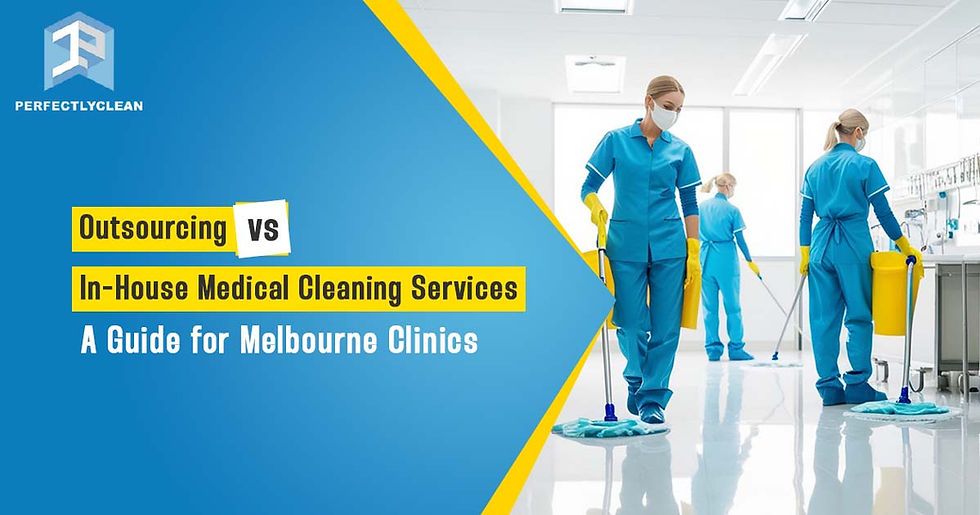Why Smart Scheduling Matters in Medical Cleaning: Lessons from 24/7 Healthcare Facilities
- Ashwin M
- Jun 27, 2025
- 3 min read
Updated: Dec 26, 2025
In healthcare, cleaning isn't just about appearances. It's about safety. Lives can depend on it. But there’s one part of medical facility cleaning that often gets overlooked — scheduling.
Think about it. A hospital doesn’t sleep. Patients come in at 2 am. Surgeries happen at 5 am.
Emergencies don’t wait for business hours. So, how do you keep an environment like that consistently clean, without disrupting care or burning out cleaning staff?
Let’s break it down.
Cleaning in Healthcare Isn’t Like Cleaning in Offices
In commercial offices, cleaners often work early mornings or after hours. That’s to avoid interrupting employees during the workday. But in hospitals or clinics? The stakes are different.
Rooms must be cleaned before new patients arrive
Operating theatres need sanitisation after every use
High-touch surfaces require frequent disinfecting
There are no “quiet hours” — it’s always active
At Perfectly Clean, we know hospital cleaning requires strategic planning. Not just about what to clean, but when and how often.
The Problem with Rigid Schedules
Many healthcare facilities still rely on rigid, traditional cleaning shifts — early mornings, afternoons, and maybe one night crew. But what happens when something urgent comes up at 3 pm, and your main team has clocked out?
Or worse, there’s a major spill in the ward at 9 pm, and there’s no one on site?
That’s when infections spread. That’s when patients are at risk.
Understaffing during “non-peak” hours isn’t a cost-saving hack. It’s a liability.
24/7 Facilities Demand 24/7 Cleaning Thinking
Take hospitals and airports. Both run non-stop. But airports often keep a skeleton cleaning crew at night, and scale up during day hours. Hospitals, on the other hand, need a more delicate balance.
From our work at Perfectly Clean, here’s what we’ve learned:
1. You need adaptive shifts
Not all cleaning tasks need to happen at the same time.
High-risk areas (ICUs, emergency wards) need frequent, scheduled disinfection
Low-risk zones (admin blocks, hallways) can be handled during quieter times
2. Real-time coordination is key
Cleaning should sync with patient movement and room turnover
For example, a room discharge at 4 pm shouldn’t wait till the next morning to be cleaned
3. Nurses shouldn’t be cleaning
In some hospitals, nurses are expected to clean when the cleaning crew is unavailable. This is neither efficient nor safe.
Dedicated, well-scheduled hospital cleaners = more effective infection control
Let’s Talk About Underemployment in Medical Cleaning
Another issue? Cleaners in healthcare often face underemployment. Many work split or short shifts. Some don’t get enough paid hours, even though the need is there.
That’s often because cleaning is crammed into limited time windows. But if healthcare facilities spread cleaning tasks strategically across the day, they can offer:
Better service coverage
More consistent cleanliness
More sustainable employment for cleaning staff
At Perfectly Clean, we build flexible cleaning schedules that serve both the hospital and the staff. Win-win.
Your Patients Deserve Better. So Does Your Cleaning Staff
Smart scheduling in medical cleaning isn’t a “nice-to-have”. It’s a critical part of healthcare delivery.
Here’s what good scheduling achieves:
Faster room turnover
Fewer infection risks
Less burnout for nurses and cleaners
Cleaner, safer spaces 24/7
And it’s what we deliver every day at Perfectly Clean.
Need a Smarter Cleaning Partner?
We are PerfectlyClean to help hospitals, clinics, and medical centres across Melbourne stay spotless — without chaos, confusion, or compromise.
Whether you run a 24/7 emergency facility or a small private practice, we’ll tailor a cleaning schedule that works for your reality — and keeps every inch of your space safe for patients, staff, and visitors.
Let’s talk.




